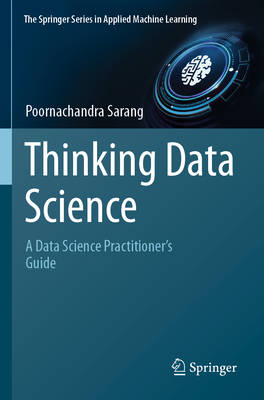
Door een staking bij bpost kan je online bestelling op dit moment iets langer onderweg zijn dan voorzien. Dringend iets nodig? Onze winkels ontvangen jou met open armen!
- Afhalen na 1 uur in een winkel met voorraad
- Gratis thuislevering in België vanaf € 30
- Ruim aanbod met 7 miljoen producten
Door een staking bij bpost kan je online bestelling op dit moment iets langer onderweg zijn dan voorzien. Dringend iets nodig? Onze winkels ontvangen jou met open armen!
- Afhalen na 1 uur in een winkel met voorraad
- Gratis thuislevering in België vanaf € 30
- Ruim aanbod met 7 miljoen producten
Zoeken
€ 63,45
+ 126 punten
Uitvoering
Omschrijving
This definitive guide to Machine Learning projects answers the problems an aspiring or experienced data scientist frequently has: Confused on what technology to use for your ML development? Should I use GOFAI, ANN/DNN or Transfer Learning? Can I rely on AutoML for model development? What if the client provides me Gig and Terabytes of data for developing analytic models? How do I handle high-frequency dynamic datasets? This book provides the practitioner with a consolidation of the entire data science process in a single "Cheat Sheet".
The challenge for a data scientist is to extract meaningful information from huge datasets that will help to create better strategies for businesses. Many Machine Learning algorithms and Neural Networks are designed to do analytics on such datasets. For a data scientist, it is a daunting decision as to which algorithm to use for a given dataset. Although there is no single answer to this question, a systematic approach to problem solving is necessary. This book describes the various ML algorithms conceptually and defines/discusses a process in the selection of ML/DL models. The consolidation of available algorithms and techniques for designing efficient ML models is the key aspect of this book. Thinking Data Science will help practising data scientists, academicians, researchers, and students who want to build ML models using the appropriate algorithms and architectures, whether the data be small or big.
Specificaties
Betrokkenen
- Auteur(s):
- Uitgeverij:
Inhoud
- Aantal bladzijden:
- 358
- Taal:
- Engels
- Reeks:
Eigenschappen
- Productcode (EAN):
- 9783031023651
- Verschijningsdatum:
- 2/03/2024
- Uitvoering:
- Paperback
- Formaat:
- Trade paperback (VS)
- Afmetingen:
- 155 mm x 235 mm
- Gewicht:
- 575 g

Alleen bij Standaard Boekhandel
+ 126 punten op je klantenkaart van Standaard Boekhandel
Beoordelingen
We publiceren alleen reviews die voldoen aan de voorwaarden voor reviews. Bekijk onze voorwaarden voor reviews.











